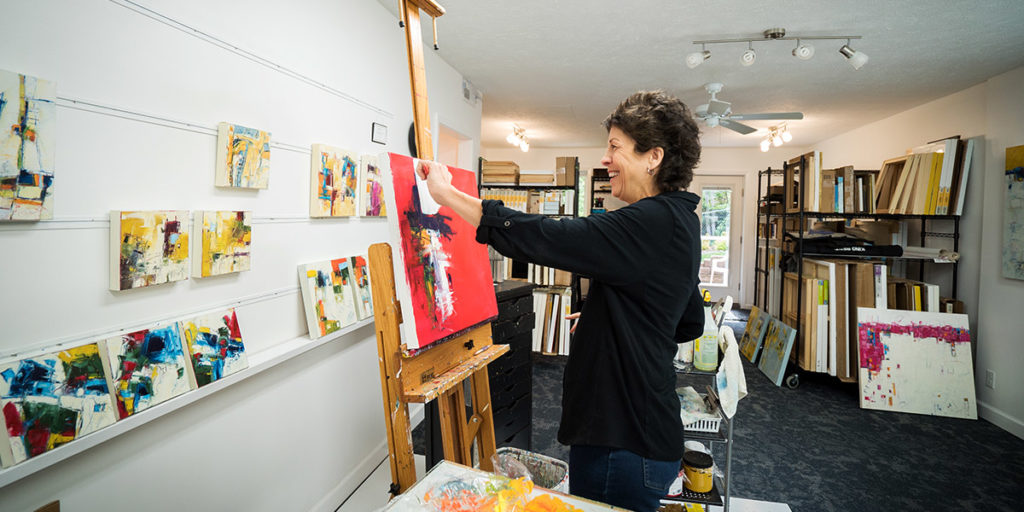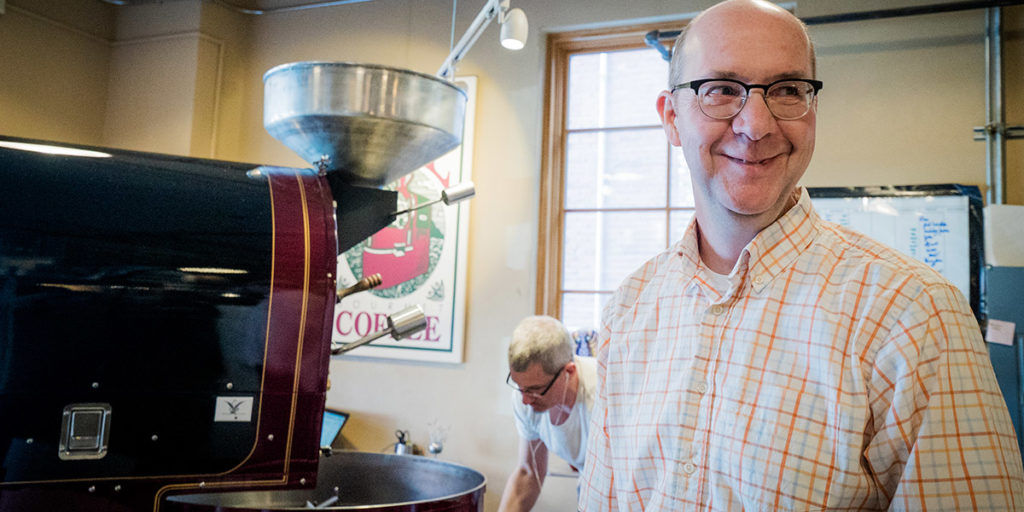
When Nancy Teague paints she comes to life. Her hand moves quickly, then slowly, intentionally and then spontaneously.
She smiles, steps back to get a better view and then moves back toward her painting.
Nancy is an abstract artist. She describes her work as emotional and free but also ordered and on-purpose.
But Nancy’s expressive abstracts are somewhat new to her – she’s only been painting in this style for three years – and yet her career as an artist started long before she ever painted an abstract.
Nancy’s style shifted to accommodate her physical and emotional changes over the past few years, and it’s a shift that’s impacted more than just her art.
Nancy said she never dreamed of being a ‘professional’ artist. Sure, she was an artistic kid who loved sketching, building and tinkering, but how could that ever be a career, she thought.
In college, Nancy graduated with a degree in education and found a job in Lincoln as an art teacher. She loved watching her students learn and create, it was the perfect fit for her.
But it was only after she quit teaching, due to budget cuts, that Nancy started to pursue her own art. She used her colors and technique to bring photographed images to life with light and texture. As a realism artist her paintings were exact, every stroke had a place and there was little room for error.
Nancy would often drive to small towns and then walk around with her camera in-hand, looking for objects to photograph and then paint in her studio. She loved the way she could bring a painting to life with shading, layers and shadows, this was her art and she was proud of it.
Over time Nancy competed in nationally ranked art fairs. She won a few notable awards and her career seemed to be off and running.
But in the late ‘90s Nancy developed a tremor in her left hand – the hand she paints with. She could no longer write her name and even something as simple as drinking water became an annoyance. Her work as a realist painter was intricate, and working with a tremor was impossible.
So, she closed up shop. She sold her materials, packed up her canvases and gave up painting.
The next ten years of Nancy’s life were quiet but impactful. They were full of thinking and evaluating, figuring out what she believed, and why her beliefs mattered. It was also frustrating. Nancy taught herself how to write with her right hand and she felt like a first-grader as she practiced rows and rows of single letters. It was hard, but Nancy was managing.
In 2008 an artist friend encouraged Nancy to explore painting again. They discussed making prints of Nancy’s former work and that got Nancy thinking… ‘I wonder if I can paint at all…’
Late one night she picked up a paintbrush and started in – she was doing it. Her tremor was there but she was painting like she used to, and to her surprise she was noticing finer details than before.
For the next five years, Nancy delighted in her realism painting and began to slowly experiment with painting styles beyond realism.
She said she felt like a child again, playing with paint, enjoying the fluid movement and testing out new methods. She found that she could paint with her left hand and right hand together, it didn’t matter, because there was so much less structure.
But something else was happening too. As Nancy shifted her art from realism to abstract, a similar shift happened inside of her, she said.
She found joy, a deep, deep inner joy that suddenly spilled out onto her canvas.
It’s a joy that came from her long-time faith in God, and a new realization of different truths about God and her own identity and purpose. Nancy said it was this inner freedom that propelled her shift to abstract painting.
“It’s hard to not do something that brings you joy,” she said.
So that’s what she’s done.
Not many artists can switch from one style to another, but to Nancy, her shift was unexpected but intentional. It was an outpouring of what she longed to experience, while still factoring in her limitations.
Nancy’s story is about learning from her doing, and growing from her learning. It’s about finding joy in a place that seemed unwanted and but turned out to be more rewarding than she could have imagined.
Her story is about realizing that there’s more to her story than she ever expected, and that was the real surprise.
